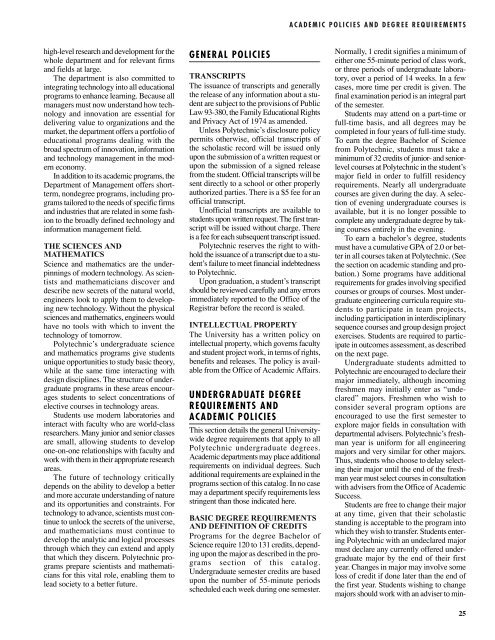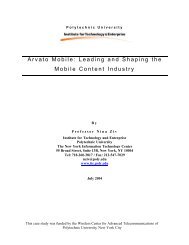POLYTECHNIC UNIVERSITY 2005-2007
POLYTECHNIC UNIVERSITY 2005-2007
POLYTECHNIC UNIVERSITY 2005-2007
Create successful ePaper yourself
Turn your PDF publications into a flip-book with our unique Google optimized e-Paper software.
ACADEMIC POLICIES AND DEGREE REQUIREMENTS<br />
high-level research and development for the<br />
whole department and for relevant firms<br />
and fields at large.<br />
The department is also committed to<br />
integrating technology into all educational<br />
programs to enhance learning. Because all<br />
managers must now understand how technology<br />
and innovation are essential for<br />
delivering value to organizations and the<br />
market, the department offers a portfolio of<br />
educational programs dealing with the<br />
broad spectrum of innovation, information<br />
and technology management in the modern<br />
economy.<br />
In addition to its academic programs, the<br />
Department of Management offers shortterm,<br />
nondegree programs, including programs<br />
tailored to the needs of specific firms<br />
and industries that are related in some fashion<br />
to the broadly defined technology and<br />
information management field.<br />
THE SCIENCES AND<br />
MATHEMATICS<br />
Science and mathematics are the underpinnings<br />
of modern technology. As scientists<br />
and mathematicians discover and<br />
describe new secrets of the natural world,<br />
engineers look to apply them to developing<br />
new technology. Without the physical<br />
sciences and mathematics, engineers would<br />
have no tools with which to invent the<br />
technology of tomorrow.<br />
Polytechnic’s undergraduate science<br />
and mathematics programs give students<br />
unique opportunities to study basic theory,<br />
while at the same time interacting with<br />
design disciplines. The structure of undergraduate<br />
programs in these areas encourages<br />
students to select concentrations of<br />
elective courses in technology areas.<br />
Students use modern laboratories and<br />
interact with faculty who are world-class<br />
researchers. Many junior and senior classes<br />
are small, allowing students to develop<br />
one-on-one relationships with faculty and<br />
work with them in their appropriate research<br />
areas.<br />
The future of technology critically<br />
depends on the ability to develop a better<br />
and more accurate understanding of nature<br />
and its opportunities and constraints. For<br />
technology to advance, scientists must continue<br />
to unlock the secrets of the universe,<br />
and mathematicians must continue to<br />
develop the analytic and logical processes<br />
through which they can extend and apply<br />
that which they discern. Polytechnic programs<br />
prepare scientists and mathematicians<br />
for this vital role, enabling them to<br />
lead society to a better future.<br />
GENERAL POLICIES<br />
TRANSCRIPTS<br />
The issuance of transcripts and generally<br />
the release of any information about a student<br />
are subject to the provisions of Public<br />
Law 93-380, the Family Educational Rights<br />
and Privacy Act of 1974 as amended.<br />
Unless Polytechnic’s disclosure policy<br />
permits otherwise, official transcripts of<br />
the scholastic record will be issued only<br />
upon the submission of a written request or<br />
upon the submission of a signed release<br />
from the student. Official transcripts will be<br />
sent directly to a school or other properly<br />
authorized parties. There is a $5 fee for an<br />
official transcript.<br />
Unofficial transcripts are available to<br />
students upon written request. The first transcript<br />
will be issued without charge. There<br />
is a fee for each subsequent transcript issued.<br />
Polytechnic reserves the right to withhold<br />
the issuance of a transcript due to a student’s<br />
failure to meet financial indebtedness<br />
to Polytechnic.<br />
Upon graduation, a student’s transcript<br />
should be reviewed carefully and any errors<br />
immediately reported to the Office of the<br />
Registrar before the record is sealed.<br />
INTELLECTUAL PROPERTY<br />
The University has a written policy on<br />
intellectual property, which governs faculty<br />
and student project work, in terms of rights,<br />
benefits and releases. The policy is available<br />
from the Office of Academic Affairs.<br />
UNDERGRADUATE DEGREE<br />
REQUIREMENTS AND<br />
ACADEMIC POLICIES<br />
This section details the general Universitywide<br />
degree requirements that apply to all<br />
Polytechnic undergraduate degrees.<br />
Academic departments may place additional<br />
requirements on individual degrees. Such<br />
additional requirements are explained in the<br />
programs section of this catalog. In no case<br />
may a department specify requirements less<br />
stringent than those indicated here.<br />
BASIC DEGREE REQUIREMENTS<br />
AND DEFINITION OF CREDITS<br />
Programs for the degree Bachelor of<br />
Science require 120 to 131 credits, depending<br />
upon the major as described in the programs<br />
section of this catalog.<br />
Undergraduate semester credits are based<br />
upon the number of 55-minute periods<br />
scheduled each week during one semester.<br />
Normally, 1 credit signifies a minimum of<br />
either one 55-minute period of class work,<br />
or three periods of undergraduate laboratory,<br />
over a period of 14 weeks. In a few<br />
cases, more time per credit is given. The<br />
final examination period is an integral part<br />
of the semester.<br />
Students may attend on a part-time or<br />
full-time basis, and all degrees may be<br />
completed in four years of full-time study.<br />
To earn the degree Bachelor of Science<br />
from Polytechnic, students must take a<br />
minimum of 32 credits of junior- and seniorlevel<br />
courses at Polytechnic in the student’s<br />
major field in order to fulfill residency<br />
requirements. Nearly all undergraduate<br />
courses are given during the day. A selection<br />
of evening undergraduate courses is<br />
available, but it is no longer possible to<br />
complete any undergraduate degree by taking<br />
courses entirely in the evening.<br />
To earn a bachelor’s degree, students<br />
must have a cumulative GPA of 2.0 or better<br />
in all courses taken at Polytechnic. (See<br />
the section on academic standing and probation.)<br />
Some programs have additional<br />
requirements for grades involving specified<br />
courses or groups of courses. Most undergraduate<br />
engineering curricula require students<br />
to participate in team projects,<br />
including participation in interdisciplinary<br />
sequence courses and group design project<br />
exercises. Students are required to participate<br />
in outcomes assessment, as described<br />
on the next page.<br />
Undergraduate students admitted to<br />
Polytechnic are encouraged to declare their<br />
major immediately, although incoming<br />
freshmen may initially enter as “undeclared”<br />
majors. Freshmen who wish to<br />
consider several program options are<br />
encouraged to use the first semester to<br />
explore major fields in consultation with<br />
departmental advisers. Polytechnic’s freshman<br />
year is uniform for all engineering<br />
majors and very similar for other majors.<br />
Thus, students who choose to delay selecting<br />
their major until the end of the freshman<br />
year must select courses in consultation<br />
with advisers from the Office of Academic<br />
Success.<br />
Students are free to change their major<br />
at any time, given that their scholastic<br />
standing is acceptable to the program into<br />
which they wish to transfer. Students entering<br />
Polytechnic with an undeclared major<br />
must declare any currently offered undergraduate<br />
major by the end of their first<br />
year. Changes in major may involve some<br />
loss of credit if done later than the end of<br />
the first year. Students wishing to change<br />
majors should work with an adviser to min-<br />
25




